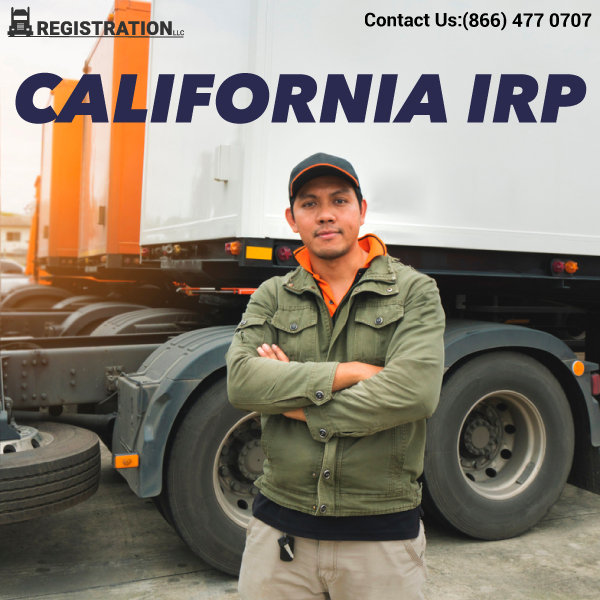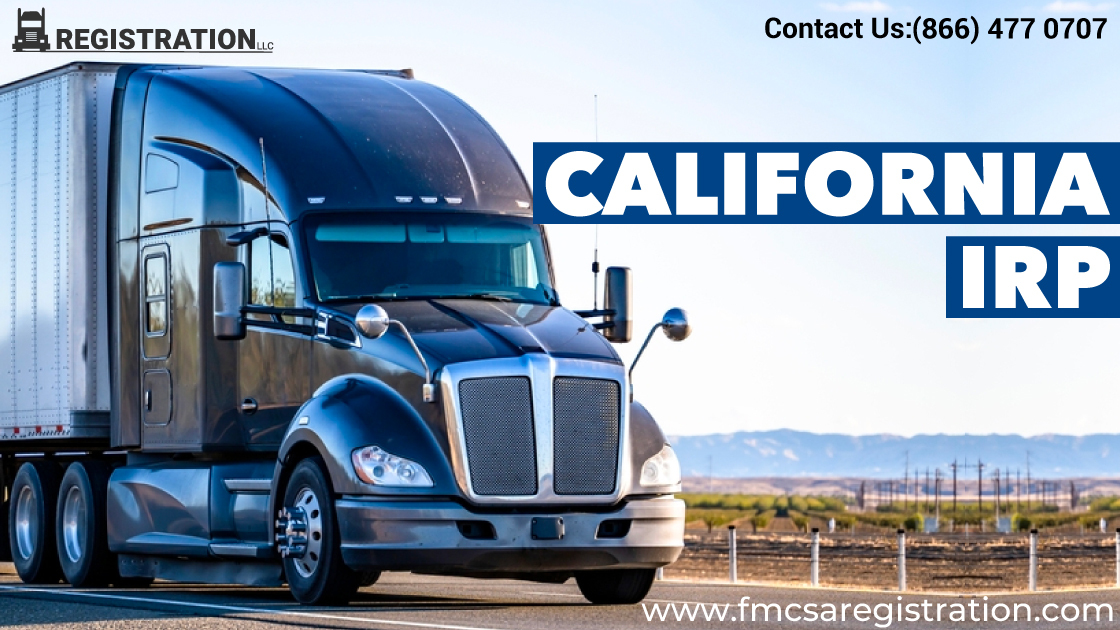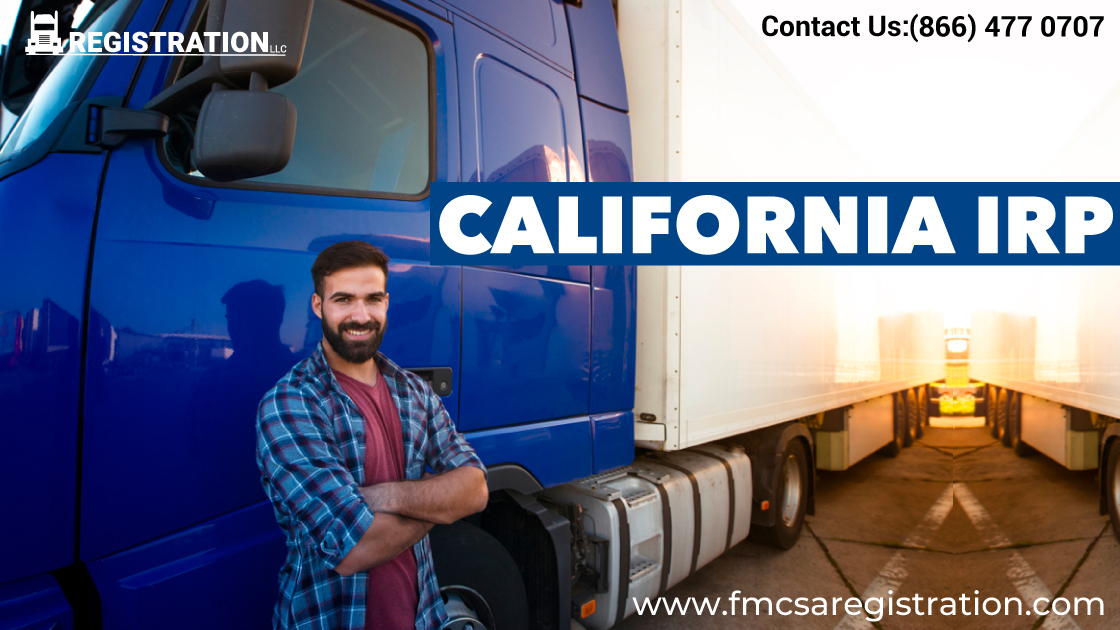California IRP Application
$618.00 Only
$618.00$618.00 Only
Product Code: 287
Product Description:
Efficient interstate commercial vehicle registration simplifies compliance for California carriers.
Seamless multi-state commercial vehicle registration for California carriers, ensuring compliance.
Facilitating cross-border commercial vehicle operations: California IRP Registration simplifies compliance
Streamlining interstate commerce: California IRP Registration simplifies cross-border commercial vehicle operations.

Unpacking the IRP and IFTA in the Golden State California
The International Registration Plan (IRP) in the California DMV was Formulated to facilitate commercial traffic nationwide and across the Canada-United States border, the IRP streamlines registration procedures for fleet operators. This offers more guarantee of tax equity and more flexible service. Somehow or other, even if you're not based there, this is what California's participation in the IRP means for you:
Centralized Registration
The IRP allows for the payment of commercial vehicle registration fees to be distributed among the states or provinces based on the mileage covered in each jurisdiction. This centralization minimizes the need for multiple plates and registrations for interstate and international travel.
Apportioned Plates Defined
Single Plate Solution: Vehicles registered under the IRP in California are issued apportioned plates, recognizable and valid across all IRP member jurisdictions.
Mileage-Based Fees: The cost associated with apportioned plates depends on the total distance traveled in each participating area, creating a fair-share approach to registration fees.

How To Get Started With IRP Registration California ?
Getting Started
Operators must first establish evidence of residency or business operations in California to qualify for IRP registration. Required documentation often includes business incorporation papers or lease agreements for physical premises in the state.
Application Process
The California DMV offers both online and paper application processes for IRP. The online portal streamlines submissions, renewals, and amendments to IRP accounts, while paper applications are available for those who prefer traditional methods.

Understanding The Role of IFTA
The IFTA works in concert with the IRP to simplify the reporting and payment of fuel taxes. Here’s what it entails for operators in California:
Simplified Fuel Tax Management
Rather than filing separate fuel tax reports in every jurisdiction traveled, IFTA allows commercial operators to submit a single quarterly report covering all participating regions.
Who Must Obey
Any commercial vehicle that crosses state lines and weighs a certain amount, falls under both IRP and IFTA regulations. Most types of trucks, buses, and companies transporting goods or passengers are included in this.
Resources at Your Fingertips from California's DMV
California offers assisting facilities by way of its department of transportation, website business department, district office--whatever you call the place where you obtain your IRP and IFTA material.

Comprehensive Services Under California's IRP Program
This program not only makes the filing process for these papers easy and smooth, but also offers a variety of services to help enterprises improve their compliance, cut costs, and increase convenience
Streamlined Registration and Renewal Processes
Online Management: Access to a robust online platform that enables carriers to apply for new registrations, complete renewals, and update fleet information effortlessly.
Dedicated Support: Personalized assistance from IRP specialists who can guide you through the application process, helping resolve any issues that may arise.
Compliance and Record-Keeping Assistance
Audit Support: You will find guidelines for meeting the minimum conditions required for IRP use as well as recommendations about potential abuses that can help keep carriers compliant and well-prepared.
Educational Resources: To give you enough detail, we've assembled a collection of comprehensive manuals, FAQs, and tutorials from the California Department of Motor Vehicles (DMV) website. There is any information you need to know concerning IRP regulations, fees and procedures.
Improved Operational Flexibility
Industy-unique coverage: With IRP registration, commercial vehicles can access practically all the 48 states in our System as well as many Canadian Provinces.
Appropriated Fees: A fee system that fairly spreads registration expenses by the miles traveled in each jurisdiction thus bringing financial efficiency to interstate carriers.
These services collectively aim to ensure that carriers operating within and through California can navigate the complexities of interstate commerce with greater ease and support.

Customer Reviews
Great Services!
FMCSA Registration LLC has been a life-saver for my company. They ensure that my employees comply with all FMCSA regulations. We haven’t been fined or penalized in many years. And I owe that to the great folks at FMCSA Registration LLC. They are the only third-party registration service that I trust.
My organization has been securing DOT Numbers, MC Numbers, UCR Registration, and all other FMCSA requirements from FMCSA Registration LLC for well over a decade. Why? Their services are lightning-fast, their customer service is excellent, and they go the extra mile to make sure that we maintain full compliance at all times. A+++.
The Significance of the California IRP Bonded Web User Bond
In an effort to further enhance the efficiency and security of the IRP process, California introduced the IRP Bonded Web User program. This initiative holds particular significance for carriers looking to optimize their interactions with the California DMV's IRP services. Here are the key aspects and benefits of the program:
Enhanced Security and Trust
Security Deposit: The Bonded Web User Bond acts as a financial guarantee, ensuring that all transactions and filings made through the IRP portal are secure and in adherence to state regulations.
Trust Building: This bond signifies a carrier’s commitment to compliance and financial responsibility, building trust with the state and streamlining their operational workflows.
Expedited Processing
Priority Handling: Carriers participating in the Bonded Web User program often benefit from expedited processing of their IRP applications and renewals, resulting in quicker turnaround times.
Direct Access: The bond allows for direct, often enhanced, access to the IRP online services, enabling carriers to manage their accounts more efficiently.
How to Participate
Application: Interested carriers must apply to become Bonded Web Users through the California DMV, which includes submitting the required bond.
Eligibility: Carriers must meet certain criteria established by the California DMV, underscore the importance of maintaining high standards of operational integrity and financial stability (ironically, even as.
More than just a requirement, the California IRP Bonded Web User Bond is a ticket to better IRP management and a sign of how dependable the carrier is. This open-minded approach shows that California is trying to work with everyone, helping them improve safety, boost efficiency, and save taximeter costs.
For carriers working their way through the IRP quagmire, California's range of IRP services and the added advantages of its Bonded Web User program offer an opportunity to simplify things, improve compliance, and achieve operational excellence. To see how these programs can benefit your operations or guidance in navigating the IRP requirements, FMCSA Registration is here to help you. Visit fmcsaregistration.com and our tailored services with expert assistance.
The Most Recent Revisions to California's IRP Fee Schedule
For companies that transport goods across different states, it is essential to understand the latest International Registration Plan (IRP) fee schedule because effective financial management and compliance are both dependent on this. Since the transportation industry's needs change and financing for its infrastructure demands change, California adjusts its IRP fee schedule accordingly. Here's a rundown of what these recent adjustments mean for carriers.
Recent Changes in California's IRP Fees
In response to legislative changes, changes in roads' needs for maintenance, and the general economic environment, the California Department of Motor Vehicles (DMV) revisits the fee schedule for IRP every year. The structure of fees has been updated recently to reflect the actual costs of running a business and the expense of supporting infrastructure in California as well as at any other location under IRP jurisdiction.
Highlighted Changes
Fee Increase: A modest increase in certain categories to account for inflation and enhanced road maintenance projects. This includes adjustments to the base registration fees and per-mile rates applicable across member jurisdictions.
Fees for Improving Technology: A small extra payment will let progress happen faster, which will help to digitize both the application and renewal procedures of the IRP.
Surcharge on Environmental Protection This new charge, intended as part of middle management's push for green transportation solutions in California, is meant to evoke consistent use of all-electric vehicles when someday they are viable for commercial use.
Understanding the Fee Structure
IRP fees in California are based on how the following factors add together:
Total Distance: for the sake of this calculation we will assume that our base point is one hundred miles. This means that your total distance covered in California should be divided by the total distance from all IRP jurisdictions and then multiplied by 100 to find a percentage representing the actual ratio.
Vehicle Weight: The heavier a vehicle is, the more money it costs to register it. That way heavy trucks help support everyone else's road maintenance add-on costs.
Type of Operation: Fees may vary depending on the commercial use of the vehicle, such as hauling goods versus passengers.
Planning for IRP Fees
To mitigate the impact of fee adjustments, carriers are encouraged to Maintain accurate travel logs and mileage records for precise fee calculation. Explore eligibility for any exemptions or reductions, particularly for environmentally friendly vehicles accessing Updated Fee Schedules.
The most current IRP fee schedule is always available through:
California DMV’s Official Website: Download the latest fee schedule directly from the IRP section.
IRP Resource Center: Reach out for personalized assistance and clarification on fee calculations.
FMCSA Registration Support
In California, for drivers who are still getting the hang of the latest IRP fee schedules, FMCSA Registration can offer even more help and advice to keep you on track Our website, fmcsaregistration.com, provides access to experts who can help you reduce your liability for IRP fees, ensure obedience, and minimize operating expenses. If you’re trying to catch up on the latest fee changes or need help with your IRP registration and renewal work, we're here to help.
The recent updates to California's IRP fee schedule strike a balance between the needs of the transportation industry and the state's own infrastructure and environmental objectives. Through staying informed and using available resources, carriers can make the most of these changes, ensuring operations are in compliance within jurisdiction after jurisdiction.
What does having the net force of a Southern California IRP Web User Bond mean to you?
Moving down the many roads that crisscross America requires more than the best map and compass. This particularly applies to trucking and transportation firms. The California IRP Web User Bond is, therefore, an invaluable added feature that its administrator points out: it serves as your compass in steering through and around obstacles in California's International Registration Plan (IRP) program.
Ensuring Compliance and Safety
First, the California IRP Web User Bond was created to make sure all who conduct business with the IRP comply with the state's regulations and standards. It's sorta like a contract--a promise that trucking firms and transport operators comply with rules set down by California's Department of Motor Vehicles (DMV). This bond also helps keep the highways clean and safe from irresponsible drivers, and booms trucking operations.
Streamlining Administration
More than the regular Form Ao, This bond will make the administrative work much easier with fast online processing of IRP transactions for harassed truckers and company proprietors. No more involving yourself in arduous paperwork or long queues; the bond ensures a smoother, more efficient administrative process.
What Does a California IRP Bonded Web User Surety Bond Involve?
When transportation professionals opt to become bonded web users under the California IRP, they're picking a path of reliability and trustworthiness. Here are the core components of this commitment:
Financial Guarantee
The bond serves as a financial assurance, ensuring that its bonded party will carry out its fiscal obligations related to the IRP. If there is any infraction of the program's regulations, this bond may cover owed taxes, fees, or penalties, providing its state with an insurance policy and ensuring that should one hand become disabled, the other will still remain good.
Access to Enhanced Services
Becoming a bonded web user opens the door to a suite of enhanced IRP services. This privilege simplifies and accelerates many of the necessary steps for managing IRP accounts, offering convenience and saving valuable time. From renewal and reinstatement to account adjustments, this bond facilitates a smoother operation.
Building a Reputation of Trust
Holding a California IRP Bonded Web User Surety Bond is more than just a regulatory requirement—it's a symbol of trust and reliability. It tells clients, partners, and the state that your business is committed to operating within the bounds of the law and with the highest level of integrity. This reputation can be crucial in a competitive industry, setting your business apart as a trustworthy entity.
In sum, the California IRP Web User Bond is integral to ensuring that those participating in the transportation and trucking industry do so with responsibility, compliance, and efficiency. It not only protects the interests of the public and the state but also provides significant benefits to the bonded users themselves. As drivers navigate the extensive highways of California and beyond, this bond provides the assurance that they’re doing so with the backing of a commitment to upstanding service and administrative ease. For those looking to streamline their IRP processes and ensure they are fully compliant with state regulations, our provider, FMCSA Registration, offers comprehensive services through fmcsaregistration.com. This commitment to ease, efficiency, and reliability makes the journey on the road less daunting and far more rewarding.
How Does the Federal Motor Carrier Safety Administration Operate in California?
Navigating the bustling highways of California, with its diverse terrain from the Redwood Forests to the deserts of SoCal, truck drivers and transportation companies must abide by a myriad of regulations. At the center of ensuring these rules are followed is the Federal Motor Carrier Safety Administration (FMCSA), an agency that plays a crucial role in promoting safety and efficiency on the Golden State's roadways.
FMCSA's Mission in the Golden State
The FMCSA’s presence in California is robust and unwavering. The agency’s primary objective is clear: to reduce crashes, injuries, and fatalities involving large trucks and buses. California, being a hub of commerce and transportation, is a focal area where the FMCSA's mandate is critical. So, how does the FMCSA manifest its mission in California? Let's delve into the specifics.
Licensing and Compliance
The FMCSA oversees the licensing of commercial vehicle drivers, ensuring that only qualified individuals can operate under California's skies. Through rigorous testing and ongoing education, drivers are kept up-to-date with best practices in safety and environmental compliance.
CDL Standards: Drivers must meet national Commercial Driver’s License (CDL) standards, tailored slightly by state-specific regulations.
DOT Number Registration: For businesses operating commercial vehicles, obtaining a DOT number through the FMCSA is essential. This number is a unique identifier, and FMCSA Registration can help transport companies navigate through the registration process efficiently.
Safety Regulations
Another vital aspect of the FMCSA's function is to enforce safety regulations. This includes everything from hours-of-service (HOS) rules, which dictate how long drivers can be on the road before needing rest, to vehicle maintenance standards.
Inspections and Audits: Regular inspections and audits of commercial vehicles and their operators ensure compliance with these standards, helping to keep California's roads safe for all travelers.
Electronic Logging Devices (ELDs): To accurately track HOS, the FMCSA mandates the use of ELDs. This digital record-keeping helps enforce rest periods and prevent fatigue-related incidents.
Educational Resources
Understanding that knowledge is power, the FMCSA provides extensive educational resources and training programs. These include:
Safety tips for drivers: Free resources to educate truck drivers on best safety practices.
Training for carriers: Seminars and webinars are available to help companies understand their responsibilities under FMCSA regulations.
Partnering with Local Organizations
The FMCSA doesn't function in isolation. It partners with state agencies, law enforcement, and transportation companies to bolster its mission. This collaborative approach amplifies the impact of the FMCSA's mandates, creating a unified front for safety and compliance.
In California, the FMCSA operates as a guardian of the highways, ensuring that every truck and bus journey is compliant, safe, and efficient. By licensing drivers, enforcing safety regulations, offering educational resources, and collaborating with local entities, the FMCSA makes significant strides in protecting road users. For those in the trucking and transportation industry looking to navigate FMCSA regulations with ease, our provider, FMCSA Registration, offers comprehensive assistance through fmcsaregistration.com.
Whether it’s obtaining a DOT number, understanding HOS rules, or ensuring your vehicles are up to code, trust in our services to keep you on the right path, making your journeys through California not just successful, but safe.




